The 2020 Browser Battle: Surfing With Speed
by Brett Howse on September 10, 2020 8:00 AM EST- Posted in
- Software
- Browsers
- Mozilla
- Google Chrome
- Microsoft Edge
Scripting Performance
As websites have gotten more and more complex, the browser’s scripting performance has continued to be extremely important. To quantitatively analyze this performance, we turn to several web-based scripting tests. The specific tests we normally leverage are being expanded to include a wider variety of workloads to get a better handle on how each browser can handle them. And, just for fun, we are including some incredibly old scripting tests just to show why they are not used any longer.
As far as hardware we are turning to the Microsoft Surface Laptop 3, featuring the Intel Core i7-1065G7 which is based on Intel’s 10 nm Ice Lake platform. It is set to run in its maximum performance mode during these tests to give the CPU its maximum boost.
WebXPRT 3
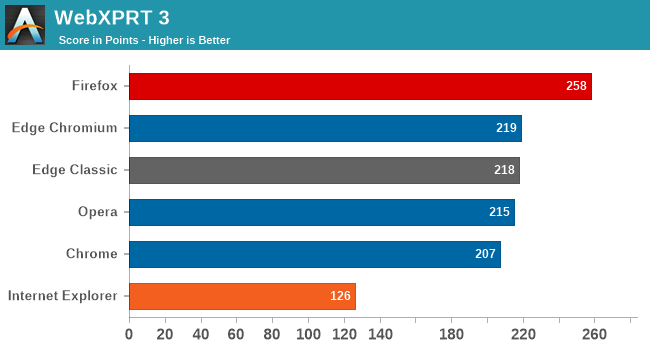
Rather than focus on a specific function, Principled Tehcnologies developed WebXPRT to simulate several real-world tasks with HTML5 and JavaScript, including photo enhancement, OCR scanning, AI, and more. If you would like to delve into how this benchmark works, and how the score is calculated, check out the report on WebXPRT as well as scoring.
In this first test, Firefox is the clear winner, easily outclassing all of the Chromium browsers which are all within a few points of each other. Interestingly, classic Edge and new Edge are almost tied. Internet Explorer does not fare as well.
Speedometer 2.0
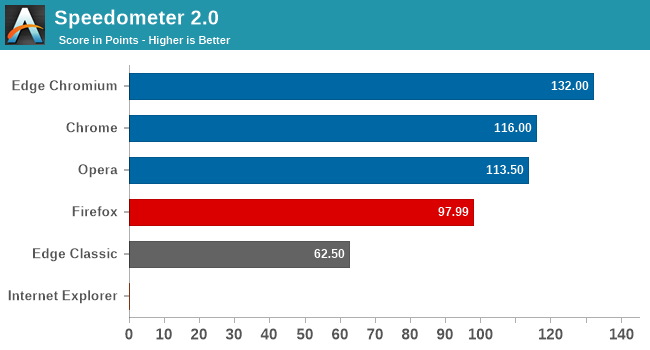
Created by Apple’s WebKit team, Speedometer 2.0 is a relatively simple test which involves adding, completing, and removing items in a to-do list. Speedometer 2.0 was created to measure the browser responsiveness. The test performs the to-do tasks with some of the most popular JavaScript frameworks available, and the score is a geometric mean of the different implementations of the to-do app, and then an arithmetic mean of the geometric means for each iteration. Apple warns against comparing the scores of different browser engines as they will do different work, which is why we use the same browser in hardware reviews.
For this test with different browsers, the scores are actually fairly similar for most browsers, although classic Edge and Internet Explorer both do poorly, with the latter not even loading the page. Interestingly, Chromium Edge does outperform the other Chromium browsers by a few points here.
JetStream 2
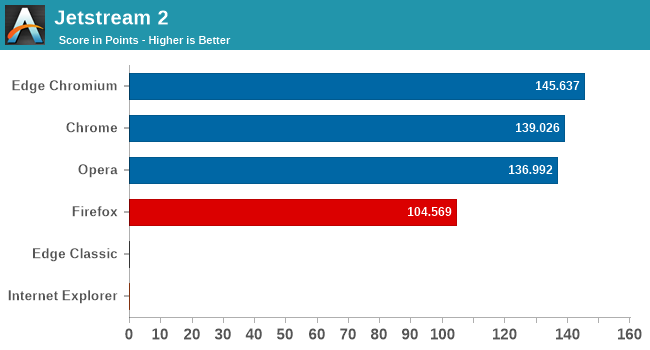
Combining JavaScript and Web Assembly benchmarks, and featuring 64 subtests, JetStream 2 includes part of some older popular scripting tests such as SunSpider and Octane 2, and each benchmark is weighed equally in the results with a geometric mean over each individual benchmark score to provide the final JetStream 2 score.
Again, we see Microsoft’s Chromium Edge slightly edge (pun intended) the other Chromium browsers. Mozilla Firefox is not quite as fast here as the Chromium browsers, and classic Edge and Internet Explorer both failed to load the test at all.
Octane 2.0
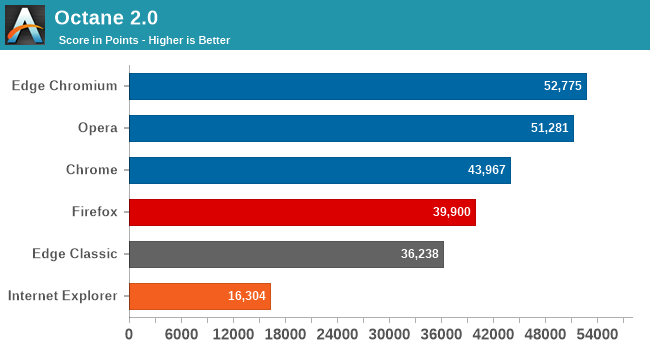
The original Octane was released in 2012, and the later Octane 2.0 was one of the most popular scripting performance benchmarks around. It focused on peak scripting performance, and as is the case, over time browser scripting engines had optimized their code to solve many of the bottlenecks that Octane was originally designed to put a spotlight on, and as such, the benchmark was retired by Google in 2017. New bottlenecks that were not being represented in Octane were common in popular sites, and this is a typical scenario with all benchmarks, but the web moves at a rapid pace.
Here we see some wide variation in results, with Chromium Edge again at the top of the stack, followed closely by Opera, and of course both are based on Chromium, but Google Chrome was not as performant on this test. All of the Chromium browsers did outperform all other browser though, with Firefox slightly behind Chrome here. Classic Edge was a bit further back, and of course Internet Explorer with its very outdated scripting engine was far behind the rest, although at least this test did run in IE 11.
Kraken 1.1
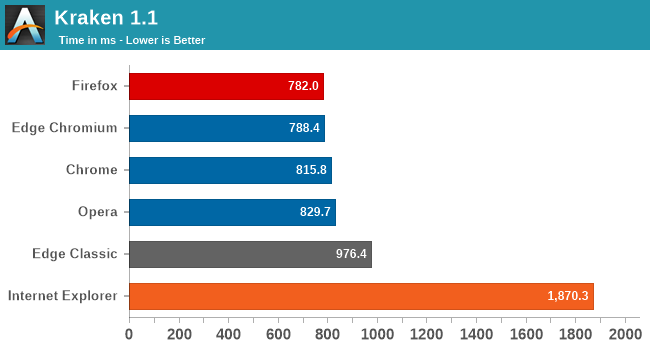
Created by Mozilla, Kraken runs several test cases from real-world applications and libraries, and includes 14 subtests. Results are reported in milliseconds to complete the tests, and as it is time-based, lower results are better.
Mozilla Firefox is our fastest browser in this test, although only by a hair. Again we see Microsoft’s implementation of Chromium Edge outperform the other Chromium browsers, although all of them are in the same range of results. Classic Edge takes a definite step back in performance here, and Internet Explorer trails the pack by a wide margin.
SunSpider 1.0.2
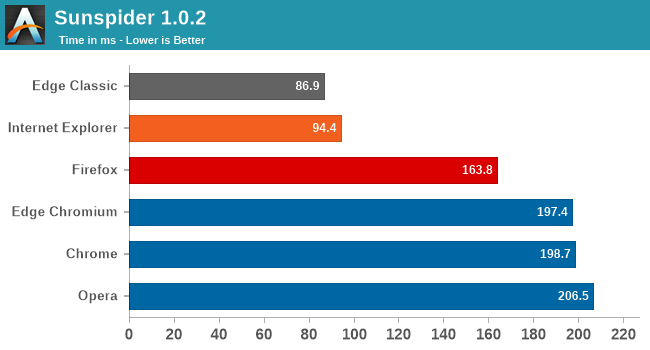
The last version of SunSpider was 1.0.2. Once this was likely the most popular scripting test around, and likely due to that, developers optimized their code to quickly overcome this test, and then found ways to work around it. SunSpider was retired and is no longer a relevant test, but since it is not too difficult to run, it was added just to see how modern browsers perform on it.
Interestingly Internet Explorer, and the newer browser based off of its code, classic Edge using EdgeHTML, both perform suspiciously high on this now retired benchmark. Whether that is due to Microsoft’s Chakra scripting engine still containing “optimizations” for SunSpider is somewhat irrelevant, as not only has the benchmark been retired, but both Internet Explorer and classic Edge are both also defunct as well.
Summary
With so many browser makers now using Chromium as their base, and contributing to its code, it should not be a huge surprise to see the Chromium browsers offering the highest scores here. Firefox does very well though, only a couple of points behind. Classic Edge, which has not been developed for over a year, is still quite compatible, but poor Internet Explorer is way behind the rest.











121 Comments
View All Comments
Gigaplex - Thursday, September 10, 2020 - link
If we get complacent and stop testing, the quality will go downhill.TheJian - Sunday, September 13, 2020 - link
ROFL. That already happened. It's why I'm still on firefox 50's (ESR stopped at ~53.x before jumping to BS new versions). A browser without multi-row tabs in 2020? WTF? You all failed. Firefox=chrome now...Again, firefox, you failed to realize who you are. DIFFERENT, CUSTOMIZATION. Now, you're just chrome lite, I mean, chrome sh!te. LOL. My family hasn't ENJOYED the web since firefox gave up. Dad's on opera now (minor complaints, he just suffers through with lots of groaning all day), moms on new firefox (accidently updated) and wants to kill her PC, and I'm on old firefox which even rottentomatoes is attacking now as not being supported...WTF do you care about my browser for anyway RT? RT is just the new GAY IMDB now anyway as if IMDB didn't own that title lock stock and barrel already. We need a new TV site...LOL. But yeah, start doing browser articles on how each has destroyed their users fun. Start doing articles highlighting what they are NOT doing, as what they ARE doing sucks already and I have no need to read about how much worse they're getting. I can see that daily. They all suck now.lioncat55 - Monday, September 14, 2020 - link
Man, who hurt you. Your family can't enjoy browsing the web now? WTF is that. Unless your compiling your own browser, most people don't remotely care about the browser they use.Also, stacked tabs? F that, that just adds on more tool bars, what are you using a 800x400 crt, do you want your browser window to be 80x400 with all the old tool bars.
Carmen00 - Friday, September 11, 2020 - link
Definitely not! The browser wars are still ongoing, and I hope that there will continue to be choice in the browser world. We've seen the terrible things that happen to standards and software when a single dominant browser decides to do its own thing, just because of its market position ... looking at you in particular, IE and Chrome. I hope that we never end up in a "Best Viewed With Browser X" scenario again — and if you don't know what I'm talking about here, thank your lucky stars. But with choice comes the necessity of seeing how good all the choices are, and this article is exceptionally useful in that regard.From the article,
"There was a years-long PR war with Microsoft begging developers to write websites to standards and features, rather than just based on a User Agent String, but that war was lost, and in a surprising, but also necessary move, Microsoft abandoned its browser and joined the Chromium gang."
Now, for those of us who remember (and had to code for) the IE6 days, this "write standard code" attitude from Microsoft was preceded by YEARS of completely ignoring the standards and telling developers to suck it up and ONLY write for IE6. They trained devs to look at the user-agent string. They created the problem, and ironically, they're the ones who had to abandon their own technology because of it!
lmcd - Friday, September 11, 2020 - link
Microsoft abandoned its browser way before then, when the Windows team or whoever is above them decided the Edge team should be stuck on a 6-month release cycle with no backports to old Windows 10 feature versions.grant3 - Sunday, September 13, 2020 - link
Would you mind clarifying: is it your opinion that it's GOOD or that it's BAD for a dominant browser engine to ignore web standards and force developers to look at user-agent strings?Or is it only bad in 2001, but good in 2020?
Or is it only bad when Microsoft does it, but good when Google does it?
Carmen00 - Sunday, September 13, 2020 - link
?? It's bad, period. Developers should never have to look at user-agent strings. What part of my post made you think that I think it's a good thing?It's just funny and ironic that it's Microsoft who made the problem and is now decrying it.
Lord of the Bored - Sunday, September 13, 2020 - link
Before Internet Explorer, we had "best with Netscape Navigator". Only diffrence was scripting to detect useragent wasn't really possible, so we put animated buttons in to make sure people knew what they were supposed to run.flyingpants265 - Saturday, September 12, 2020 - link
Firefox is clearly faster than Chrome but I don't understand why the UI sucks so bad. Just give us the option to make the UI identical pixel-for-pixel to Chrome, and I'll switch to FF instantly.JfromImaginstuff - Tuesday, September 15, 2020 - link
Well there some themes that you could use if all you're after is looks else I don't know